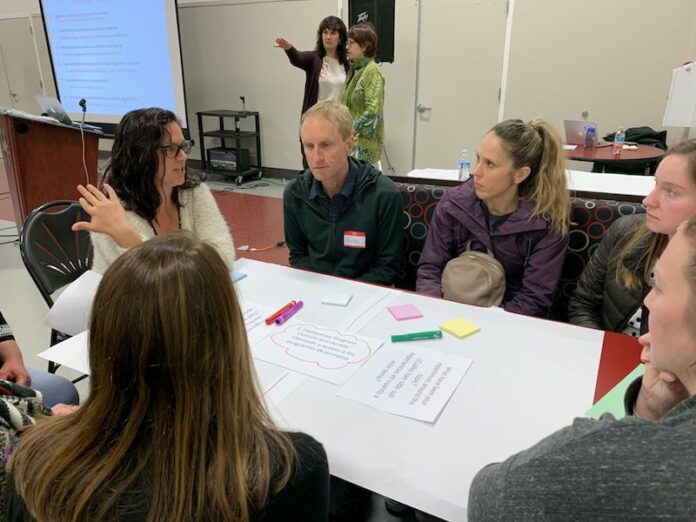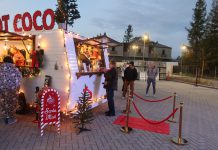
Community members voiced their equity concerns at the Healdsburg Unified School District special town hall meeting Feb. 5.
Several parents, teachers and staff opined that the district, specifically elementary schools in the district, are struggling with consequences of the Accelerated English learning program (AE) and with accessible school program information for Latinx families. AE replaced the previous immersion program and has an intense focus on English learning in place of electives such as the arts or sciences.
The overwhelming consensus was that the program had positive intentions but unintentionally created a class segregation and inequality in learning. Additionally, Spanish speaking families feel there is a hurdle in finding accessible information about available elementary school programs.
The meeting was organized by the Healdsburg Equity Task Force and the Oakland-based National Equity Task Force. It was called to garner more thoughts and feedback on the district’s equality standards.
It also served as a continuation of the group’s fall 2018 listening campaign.
In a letter to the community, HUSD Superintendent Chris Vanden Heuval said, “We want to hear from all of our families to clearly understand struggles, frustrations, triumphs and areas of pride. As we seek to build unity amongst our children, we first must learn to come together as adults.”
Around 100 people came together as adults at the Healdsburg High School cafeteria to listen to a presentation from National Equity Task Force lead Mark Salinas. They then broke out in four different table groups to share their thoughts and feelings in a lively and candid discussion.
Each table was given a theme, elementary program options, English language development, parental engagement and district experience. Stations were manned with Post-it notes and translators so everyone could share their feelings and ideas. Later, individual tables reported their findings to the group as a whole.
Despite the four topics, the recurring areas of concern settled on the elementary program options, lack of information and the consequences of the changes in the English language development program.
“My kids have had a great experience at the charter school (Fitch Mountain Charter),” Lisa, a Healdsburg parent, said. “I did notice that sometimes there is that feeling that it’s a separate school and as much as I loved what my child was getting, I didn’t like that it felt like it was ‘the other school.’”
Other parents, Holly Fox and Maria Hadley agreed, saying their hope was that all kids could get the same access to everything, even if they were in an AE or immersion program.
While some Spanish-speaking families noted, with a translator, that they thought the AE program was “fabulous” and that the charter school had good teachers, some reiterated the concern regarding lack of information.
One person wrote on a Post-it note that they simply needed more information about the two schools.
A local parent named Brandy, who was sitting at a bilingual table, said finding the right resources for her child was difficult despite being in the know about the resources at hand.
At the “parent engagement” table, Alissa Lind said while she’s had positive communication with the schools, she said there needs to be more communication between parents, teachers and students, especially as they transition from grade to grade.
Over at the English language development table, parents said while they do not think the AE program was created with a malevolent purpose in mind, they do believe that it creates negative consequences by separating English and Spanish-speaking students.
Others also said that the lack of resources for teachers to be able to instruct both English and Spanish-speakers may also have led to unintentional segregation. They also noted that the frequent change in administrators and programs could have an effect.
“It’s hard going through so many different administrators, each principal has their own idea on what (program) is good,” district worker Rob Baum pointed out.
Attendee thoughts and takeaways also echoed the listening campaign report released at the Dec. 19 HUSD board of trustees meeting.
In November and December, the task force, in coalition with then National Equity Task Force, interviewed 47 people who had a stake in the district. Thirteen school staff members across multiple levels and schools, 11 students, 22 current parents and six parents of former HUSD students were interviewed.
The key findings of the interviews were broken down into certain categories relating to what they were about.
Key concerns regarding the English language immersion program included a perception of lack of transparent information and a history of concerns with school configuration with a sort of de facto segregation with Healdsburg Elementary School and the charter school.
Findings regarding feelings toward the charter school and the AE program showed that the two programs create unintentional racialized outcomes with the charter school “stemming white flight to other area schools” and the AE program creates unequal access to education.
So what can the district do to address all of these concerns? While this first meeting merely served as a vehicle to receive input on the issue and to garner concerns, Vanden Heuval said the next step towards working to a resolution will be to address the issues at hand.
“This next phase in work will take place this summer and early fall before any systemic changes before the board,” Vanden Heuval said. “We’ve had issues in our community and in our district historically. Not too long ago we had neighborhood schools that were clearly segregated by race, we had questions around the immersion program and we’ve had the opportunity to learn about some family’s experiences and they are really heartbreaking.”
Vanden Heuval continued, “I want to say on behalf of the entire school district that I am sorry.”
If you missed out on this meeting, the task force will hold another meeting Feb. 25 at 6 p.m. at the Healdsburg High School cafeteria.







